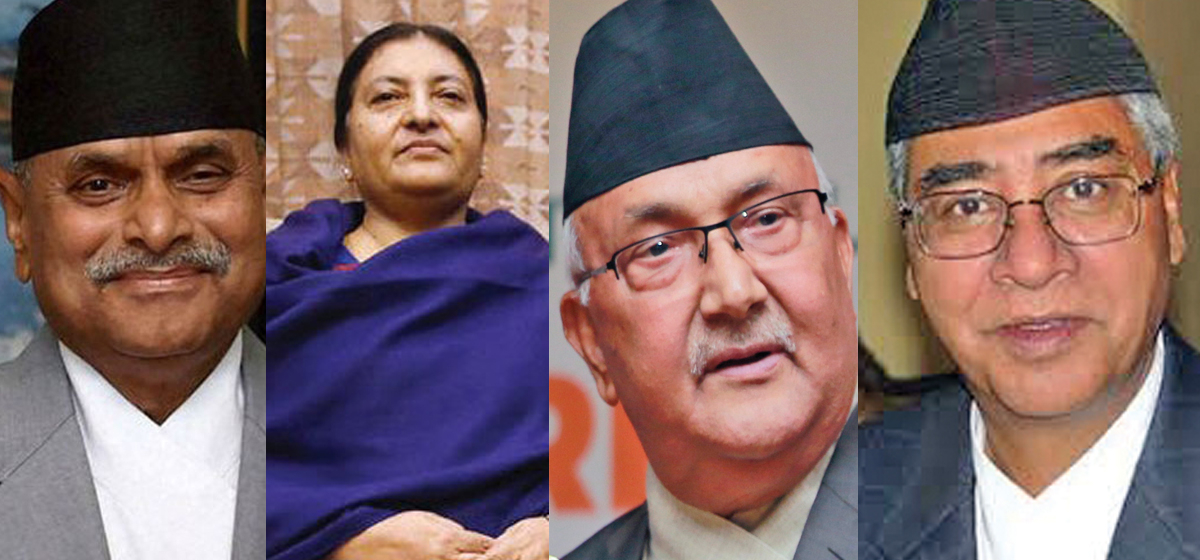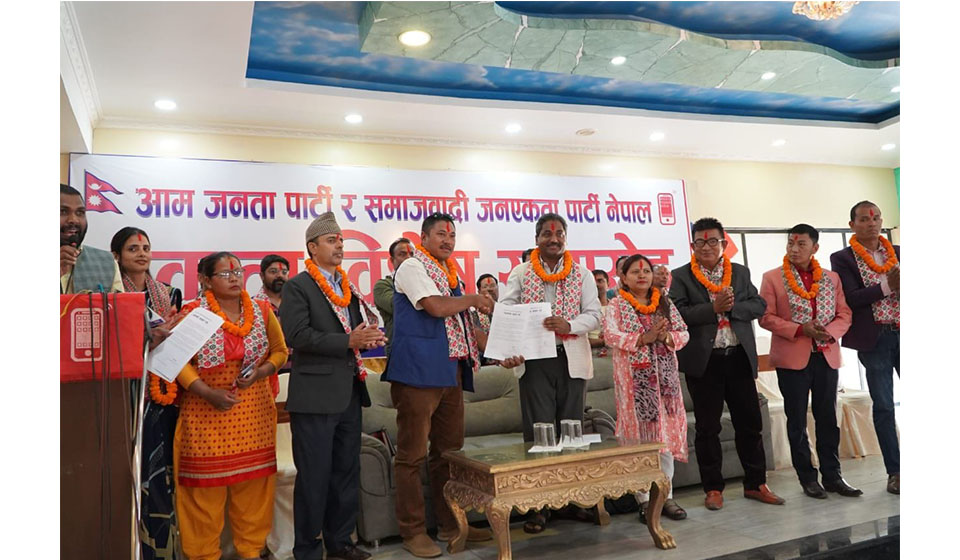
OR
Why politicians in Nepal go abroad for medical treatment
Published On: June 14, 2023 06:00 PM NPT By: Pabitra Sunar

KATHMANDU, June 14: Over the past 15 years, Nepal has made significant progress and advancements in its healthcare services. Doctors claim that all other treatments except for the treatment of rare diseases that need ultra-modern technologies are possible within Nepal. But there is still a tendency among politicians to seek treatment abroad, even for relatively common health issues.
Former prime minister and chairman of Nepali Congress (NC) Sher Bahadur Deuba and his wife Arju Rana Deuba left for Singapore on Tuesday for a follow-up. They often visit Singapore for their routine health examinations. Deuba's press advisor Govinda Pariyar said, “The former prime minister has gone to Singapore once again for his routine health check-up. I am unaware of the specific details but Deuba regularly visits Singapore for health examinations.”
It has been a long-standing practice for leaders to seek medical check-ups or receive treatment abroad - whether it is for routine health check-ups or for minor or major illnesses. The then president Ram Baran Yadav and Bidya Devi Bhandari, former prime minister KP Sharma Oli, CPN (Unified Socialist) leader and former prime minister Jhala Nath Khanal, Maoist leader Narayan Kaji Shrestha, Barshman Pun and others visited India, China, Japan, Thailand, Singapore and other countries for treatment.
The National Academy of Medical Sciences (NAMS) has a separate arrangement for treating VVIPs and VIPs. In recent days, medical professionals say that both government and private hospitals are able to provide treatment for even the most complex medical conditions. "We say that we can treat many diseases in Nepal, but we recommend the leaders at the highest level of the state to go abroad only for extremely complex diseases that cannot be treated in Nepal. However, some leaders go abroad because of their choice and personal reasons," said Santosh Paudel, the director of Bir Hospital. According to him, in case there is a need for treatment abroad, the Medical Board recommends it.
“The decision of where to seek treatment is up to the individual, and doctors cannot put any restrictions on that choice,” he stated. Paudel says that some leaders go abroad for treatment because of financial access. "People go abroad for treatment due to their financial capacity and high social status," he said.
He recalled that some members of parliament (MPs) and both former presidents came to Bir hospital for dental checkup. He says that leaders also go abroad as they do not believe in the healthcare system of their own country.
Dr Santa Kumar Das, assistant director at Tribhuvan University Teaching Hospital, said, “Although Nepal has made significant progress in healthcare, there are still some leaders who have the mindset of seeking treatment abroad.” He mentioned that these leaders opt to go abroad even for minor illnesses that can be effectively treated in Nepal.
Das pointed out that after the treatment of major diseases started in Nepal, some leaders stopped seeking treatment abroad. According to him, former Prime Minister KP Sharma Oli underwent a kidney transplant for a second time at the Tribhuvan University Teaching Hospital. CPN (Unified Socialist) Party Chairman Madhav Kumar Nepal was also treated for pneumonia at this hospital. It was also found that leaders go abroad when some doctors recommend them to do so for the treatment of common diseases.
Former Director of Maternity Hospital and Gynecologist Dr Jageshwar Gautam said that even though the treatment of the disease of some leaders is possible in Nepal, they go abroad. "There is no need to go abroad for medical treatment anymore. The leaders do not have faith in the healthcare system that they have established themselves," he said.
Dr Gautam said that despite the availability of treatment for certain illnesses within Nepal, some leaders choose to seek treatment abroad. He emphasized that there is no longer the need to travel overseas for healthcare, but the politicians lack trust in our healthcare system.
According to Dr Gautam, Nepal has as skilled human resource in the medical field as in other countries, but there is a lack of quality infrastructure and adequate medical equipment to enhance the standard of healthcare services. This is why the politicians choose to go abroad for treatment, he said. He emphasized, "The hospitals which have competent doctors lack in equipment and quick medical services."
Dr Gautam mentioned that the trend of leaders seeking medical treatment abroad by weakening the country's health institutions and the lack of their trust in the healthcare system they themselves have built is detrimental to the country. He also highlighted the government's lack of focus on improving the quality of healthcare services. He emphasized the need for increased budget allocation in order to enhance healthcare services, make them more comprehensive, and equip them with modern technology.
According to Dr Gautam, neighboring India has developed the capacity to treat 25,000 patients daily for free only through All India Institute of Medical Sciences (AIIMS) and has strengthened its health system by recalling doctors who have left their country. "India has brought back Indian doctors who were staying in the United States. In Bangladesh, too, politicians do not go abroad for treatment when they are taken ill," he said.
Dr Jhalak Gautam Sharma said even though the country has adequate healthcare services available, leaders still choose to go abroad for treatment due to a lack of confidence in their own healthcare system. He mentioned that the inclination of leaders towards seeking treatment abroad is also in practice as they have the wrong mentality that it enhances their reputation. Dr Gautam further emphasized, when leaders choose to seek treatment abroad, it sends a message that the country's healthcare system is not reliable. This highlights the need for leaders themselves to be attentive and aware of this fact.
The act of politicians seeking health treatment abroad not only undermines trust in the country's health institutions but also leads to the outflow of the country's resources. The tendency of politicians to go abroad also seems to have increased because the medical expenses of the leaders are paid from the state coffers. Now the politicians should not go abroad for treatment, but they should work to make the country's health institutions modern, quality and reliable, Gautam says. He adds that emergency services, necessary manpower, equipment and other facilities should be arranged in the hospitals to increase reliability in Nepal's health system. If qualitative and quantitative services can be expanded, the trend of going abroad for treatment can be stopped.
You May Like This

Pesticide residue found in vegetables in Nepalgunj
RANJHA, April 27: The vegetables kept for sale at Rani Talau Vegetable Market of Nepalgunj in Banke district have been... Read More...

Ilam-2 by-elections held peacefully, vote count likely to start tonight
ILAM, April 27: The voting in the Ilam -2 by-elections was held peacefully on Saturday, with vote count expected to... Read More...

NEA schedules five-day power cut across Kathmandu Valley for underground cable installation
KATHMANDU, April 27: Various places of the Kathmandu Valley will experience a daily four hour power cut for five days,... Read More...
Just In
- Sunkoshi-Marin Diversion Project’s tunnel construction nears completion, breakthrough scheduled for May 8
- Govt tightens security arrangement for Third Investment Summit 2024
- Pesticide residue found in vegetables in Nepalgunj
- Aam Janata Party and Samajwadi Jana Ekata Party merge
- 1,600 participants confirmed for Nepal Investment Summit
- Ilam-2 by-elections held peacefully, vote count likely to start tonight
- NEA schedules five-day power cut across Kathmandu Valley for underground cable installation
- Hundreds of passengers including foreign tourists in distress as poor visibility halts flights to and from PRIA








-1200x560-wm_20240427144118.jpg)







Leave A Comment